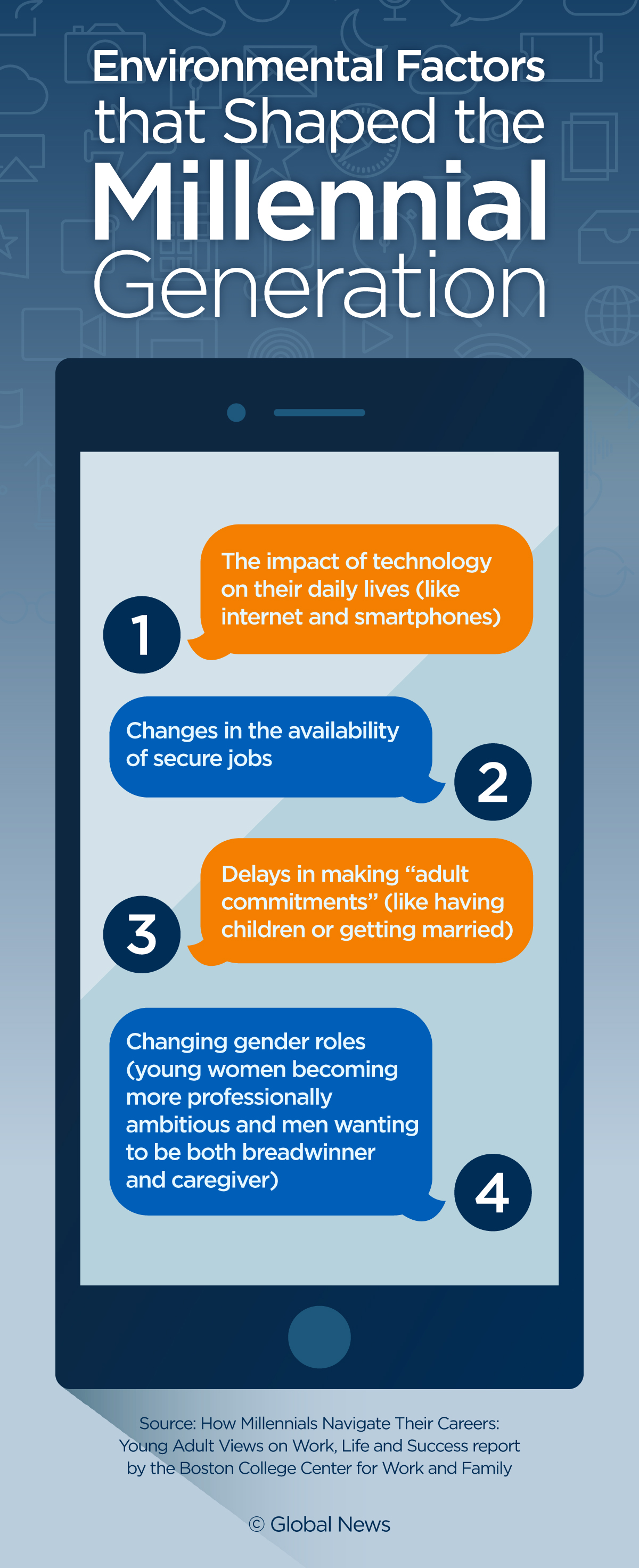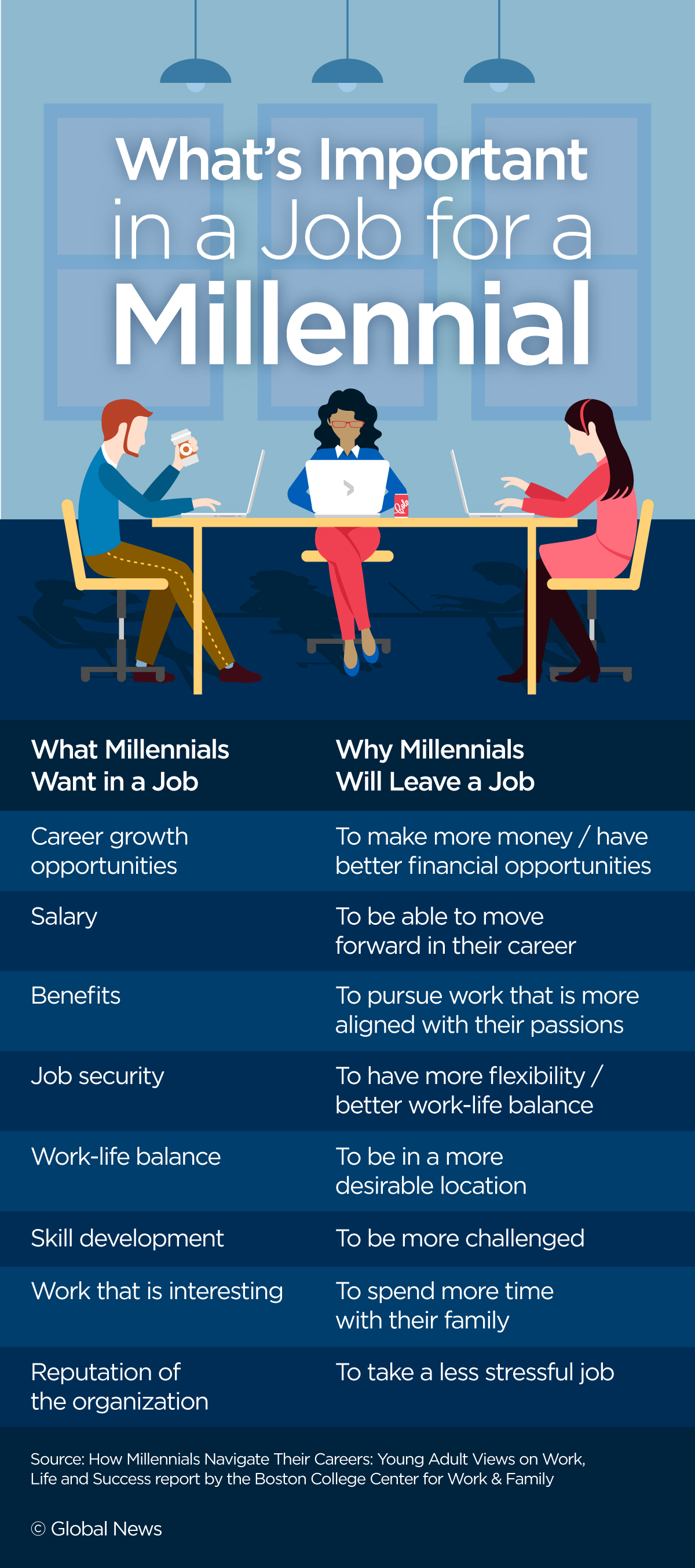An unprecedented revolution is happening in workplaces across North America that’s forcing major change within organizations and creating tension among employees and employers.

Who’s at the centre of it all? Millennials — but not in the way you may think.
For the first time in history, there are five generations of employees sharing office space across the continent: traditionalists, baby boomers, generation X, millennials and generation Z.
READ MORE: Job-hopping and standing desks: Millennials shaping modern work environments
With that many cooks in the kitchen, there’s bound to be some clashes amongst the old and the young. According to experts, that leads to one messy kitchen in serious need of a renovation.
So what’s causing the breakdown of today’s workplace dynamics?
It’s a subject that is regularly revisited but up until now, experts have only understood a fraction of what’s been going on — and it turns out that despite common stereotypes, millennials are not to blame (at least not entirely).
Global News spoke with Scott Allinson of the Human Resources Professionals Association (HRPA) in Canada and Morag Barrett, CEO of Colorado-based professional development firm Skyeteam, who each offered their own theories on the cause and effect of such change in the workplaces, and what it means for the professional futures of millennials and upcoming generations.
The retirement delay
Both Barrett and Allinson agree: Better health and increased longevity is having a huge impact on the workforce, which is forcing traditionalists and baby boomers to work longer and delay retirement.
“They see that down the road they’re going to need more money,” Allinson says. “So they’re staying in to maximize that as much as possible. But if they do have a very good pension plan, they will leave early because they know they have a guaranteed pension up until a certain point.”
Another factor delaying retirement was the fallout of the economic downturn experienced by both Canada and the U.S.
But when the traditionalists and baby boomers eventually do retire, Barrett says there’s going to be a significant knowledge gap organizations will struggle to fill.
READ MORE: The good versus the bad: Technology’s place in the lives of millennials
And because of the delay with both baby boomers and millennials, Barrett thinks that millennials and future generations will not have the typical retirement their parents did. Instead, she believes they’ll be replacing it with sabbaticals.
“Look at the size of the retirement pot that we would have to save for if you think we’re going to retire at 65 and maybe live another 35 to 40 years,” Barrett says. “I’m already starting to see that change happening in both big and small companies that are offering both paid and unpaid sabbaticals. Because what they allow today is more of a braided system where you get rid of that old work-life cliché. It’s all life, but it’s now periods of work that then fund a sabbatical — whether that’s travel or learning — and then returning to the workplace to refill and replenish the coffers… That becomes much more manageable, and it allows the workforce to become more nimble.”
Enter the millennials
When millennials first began shaping their generational identity within the world, they were often pegged as lazy, disloyal, highly self-interested and heavily reliant on technology.
But is that true — and if so, is it their fault?
According to a report by the Boston College Center for Work and Family, millennials were shaped by several environmental factors, some of which they had no control over, such as the impact of technology and the lack of available and secure jobs.
So when millennials began entering the workforce, those labels of “lazy” and “disloyal” followed them, and companies — for varying reasons — decided it wasn’t worth investing time and money into recruiting and retaining millennial employees.
What’s more, those decisions were being made by the three preceding generations who held (and continue to hold) positions of decision-making power and didn’t quite understand what millennials were all about.
That lack of understanding on all sides contributed to the generational clash that’s happening in workplaces today.
“I do think there’s clashing, but I wonder how much of that is also stereotyping of the different generations,” Barrett says.
As a recent report by the HRPA on Canadian millennials in the workplace found, millennials are perhaps one of the most misunderstood generations in recent history.
In fact, it found that millennials want the same things in life and work as preceding generations — they’re just more likely to speak up about what they want and are willing to do whatever it takes to achieve their goals.
That’s perhaps why work-life balance is one of the top things millennials consider important in their careers. Allinson says this factor is so important to them that they’re willing to give up a job with a good salary if it negatively impacts that balance.
Integrating millennials into the workplace
It won’t be long before the older generations begin to retire, and when they do, there’s going to be a significant knowledge gap that organizations will need to fill, Barrett says.
So now more than ever, it’s important that companies get serious about integrating millennials, Allinson says.
But here’s where the waters get murky. According to the HRPA report, 61 per cent of millennials say they will leave their current employer in the next four years. There’s a few reasons for this.
Firstly, millennials don’t feel they’re being utilized to their full potential and say there’s a lack of mentorship available to them.
Secondly, millennials have become a product of downsizing, the Boston College Center for Work and Family says. According to the center, when companies dramatically downsized in the last century, employees accepted the fact that job security would no longer be the norm. This forced young professionals to see themselves more as freelancers and they began to have low expectations when it came to job security — even though they highly valued it.
READ MORE: The post-millennial generation: What’s coming next?
But, Allinson says, companies may be surprised at just how well investment in integration can pay off.
He adds, “It’s like anything else where you get comfortable with what you’re doing. You don’t think about what’s new and what you should be doing for best practices.”
— Graphics provided by Janet Cordahi and Deepak Sharma








Comments